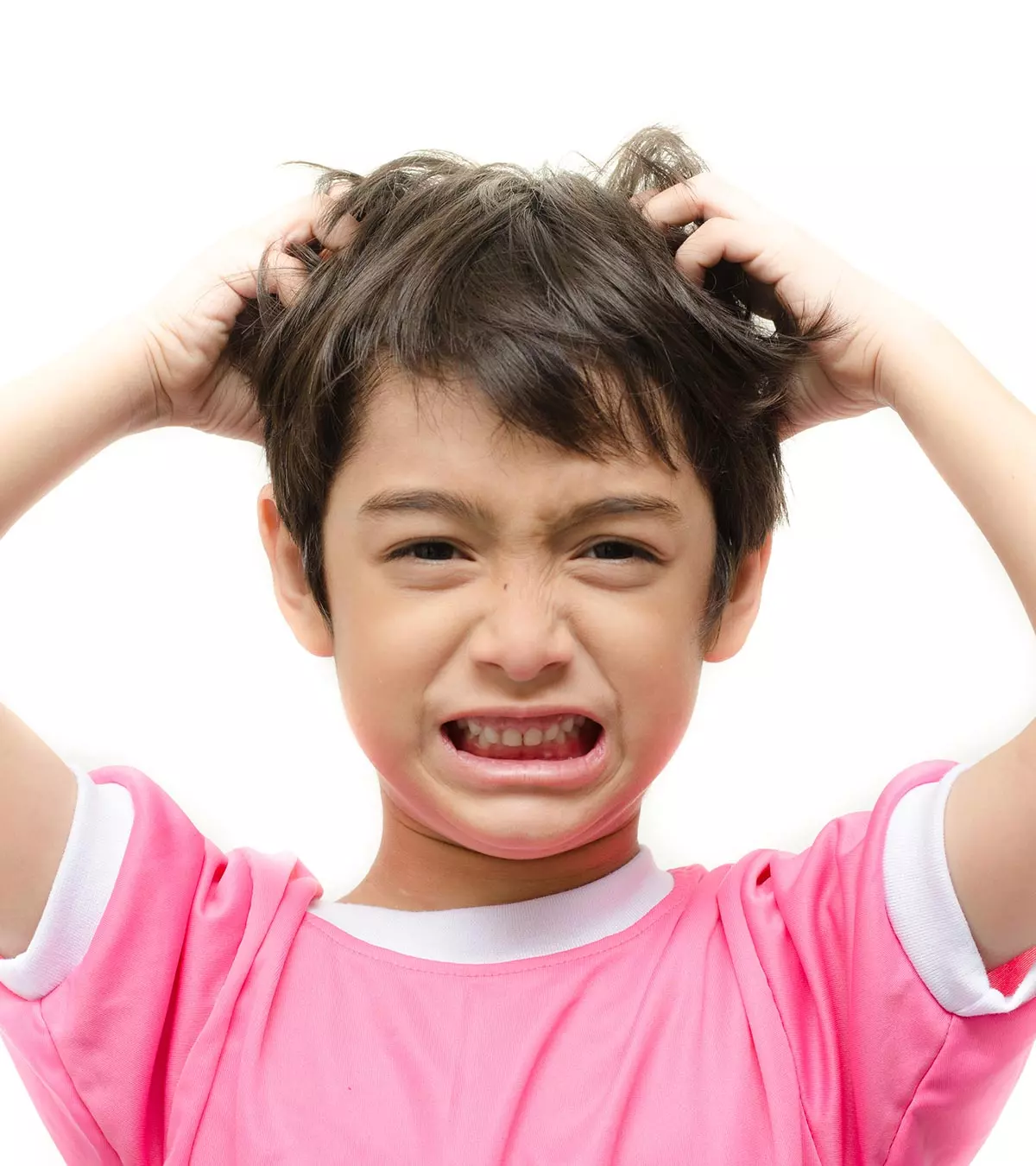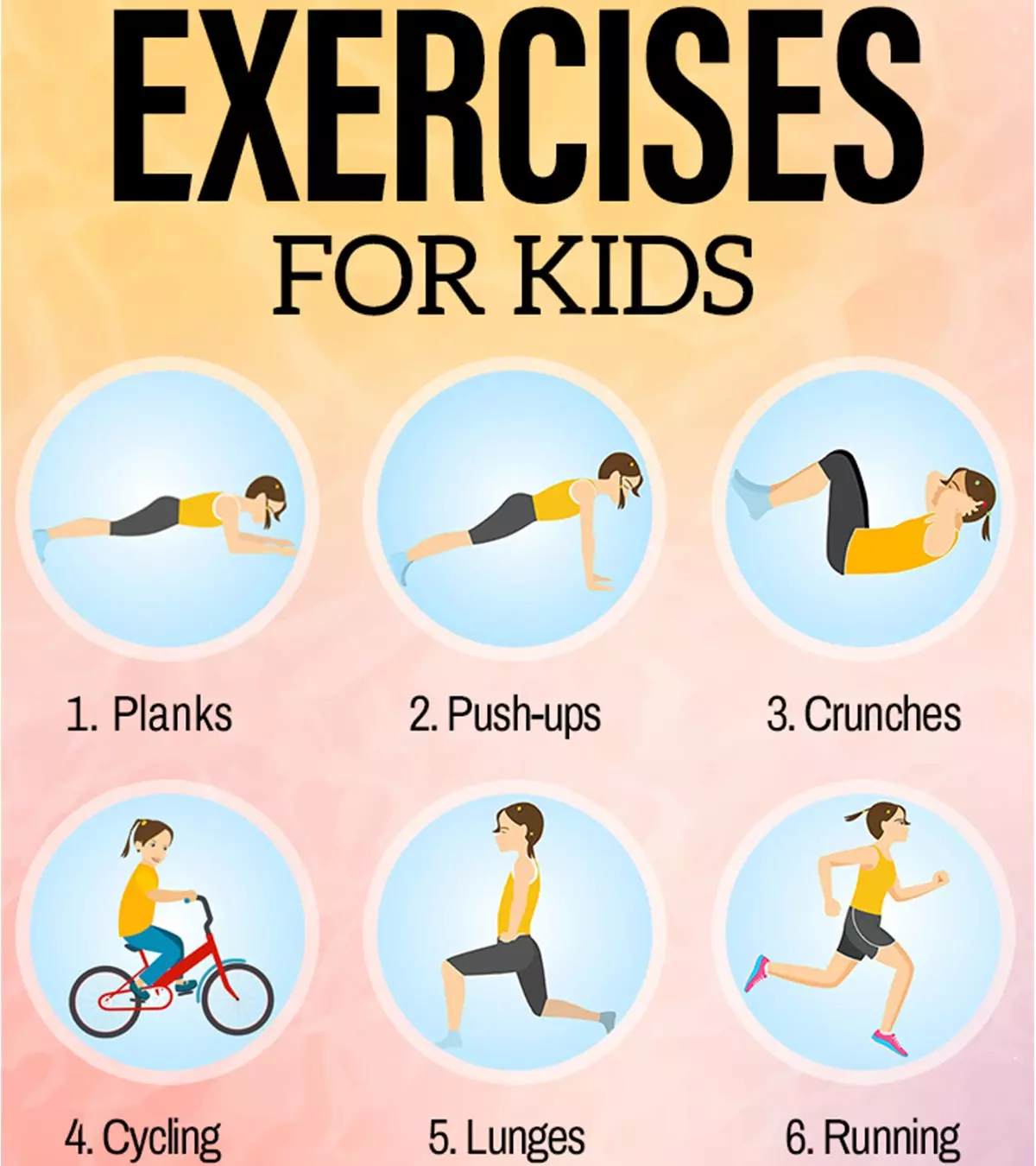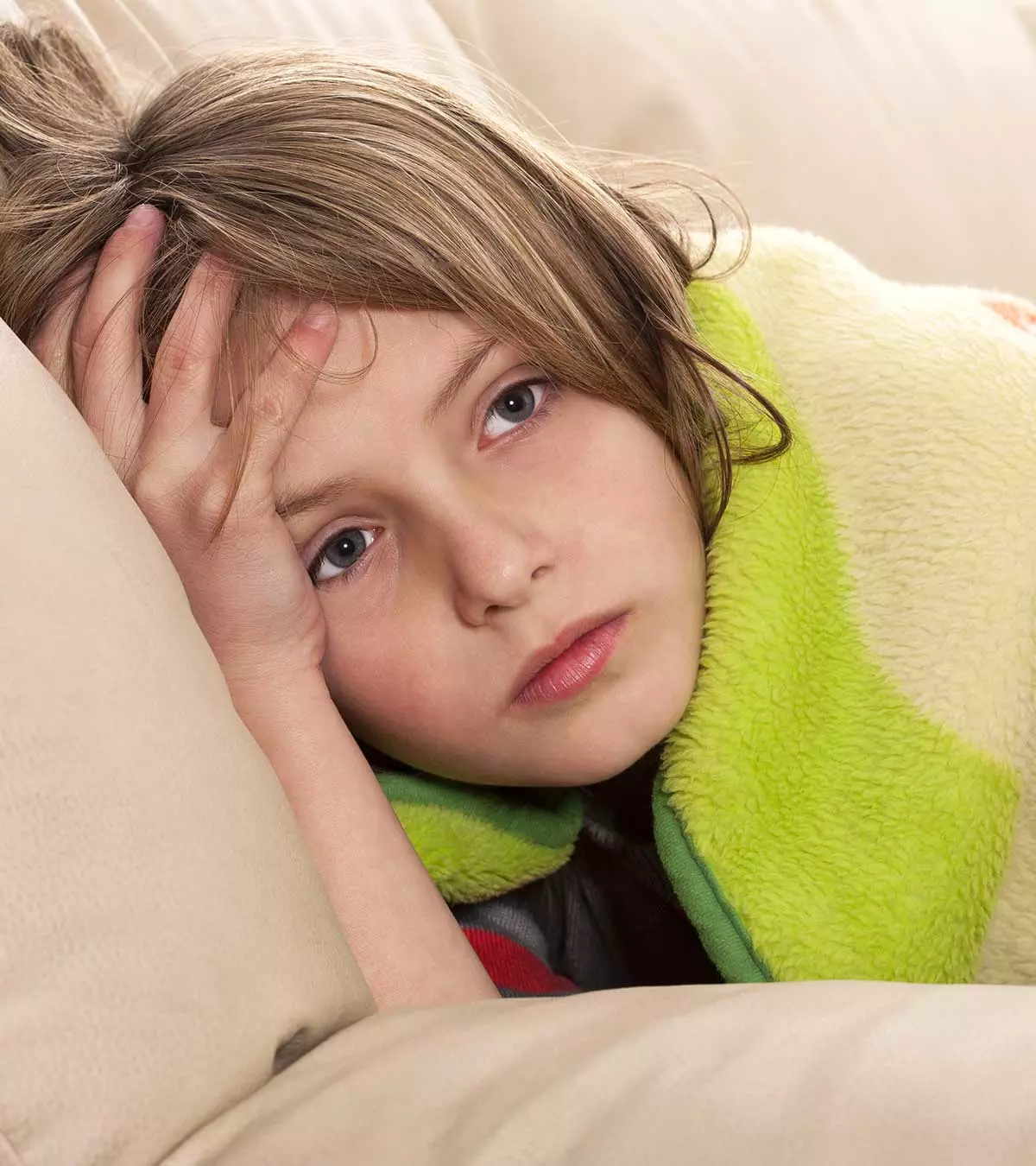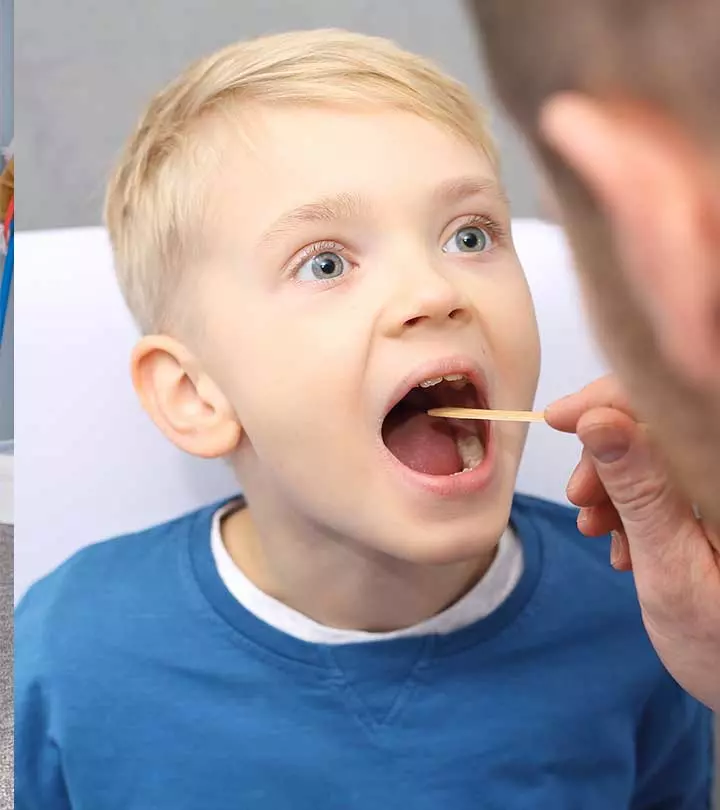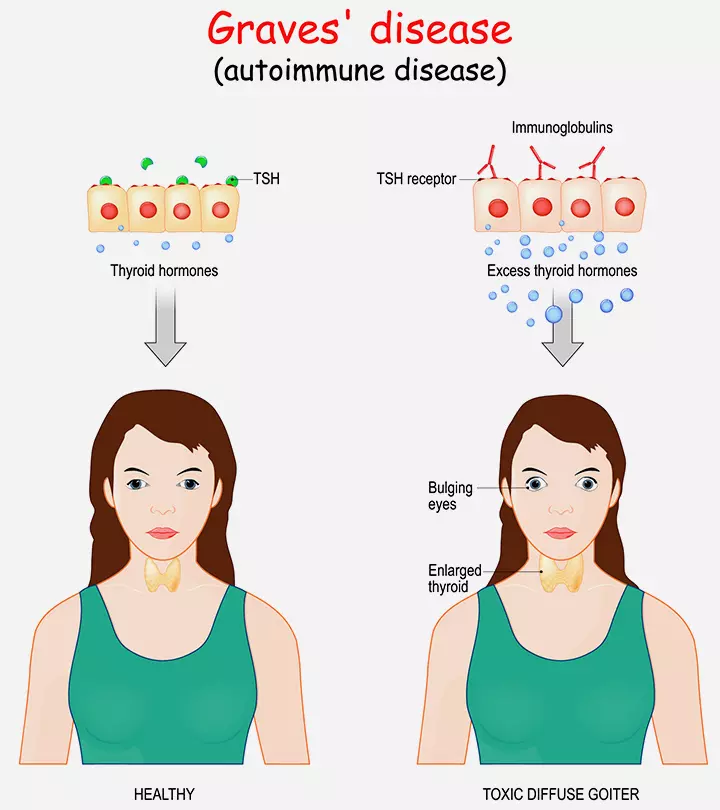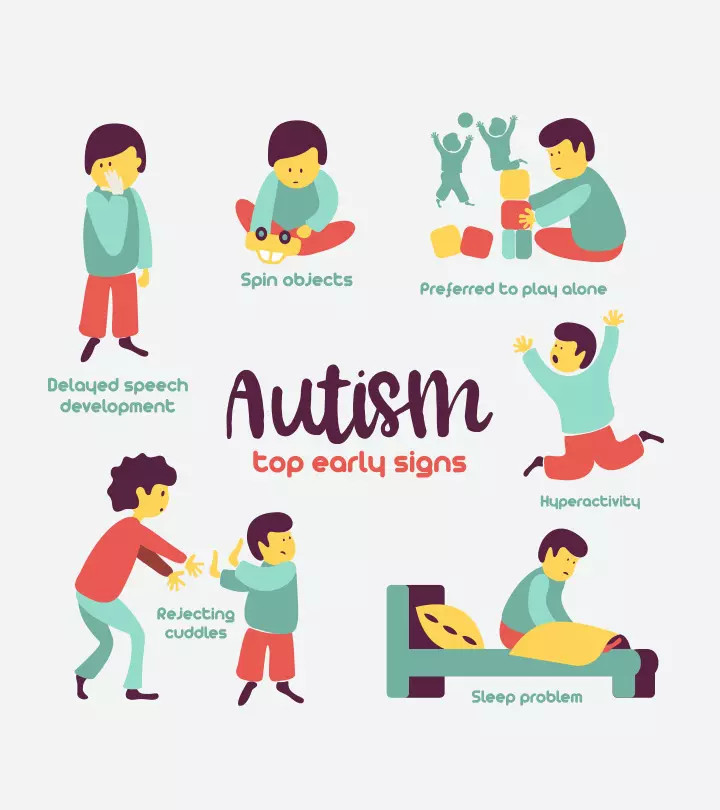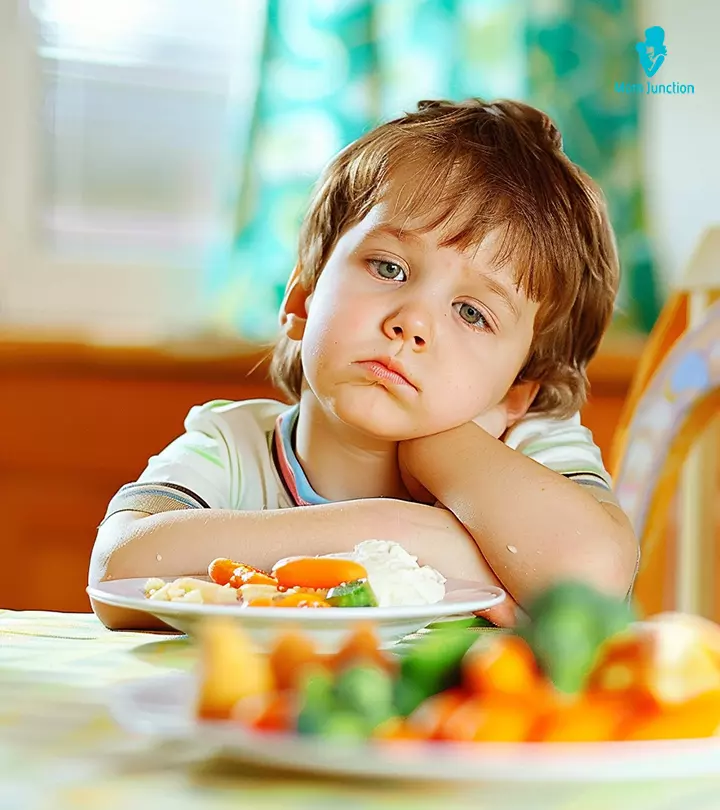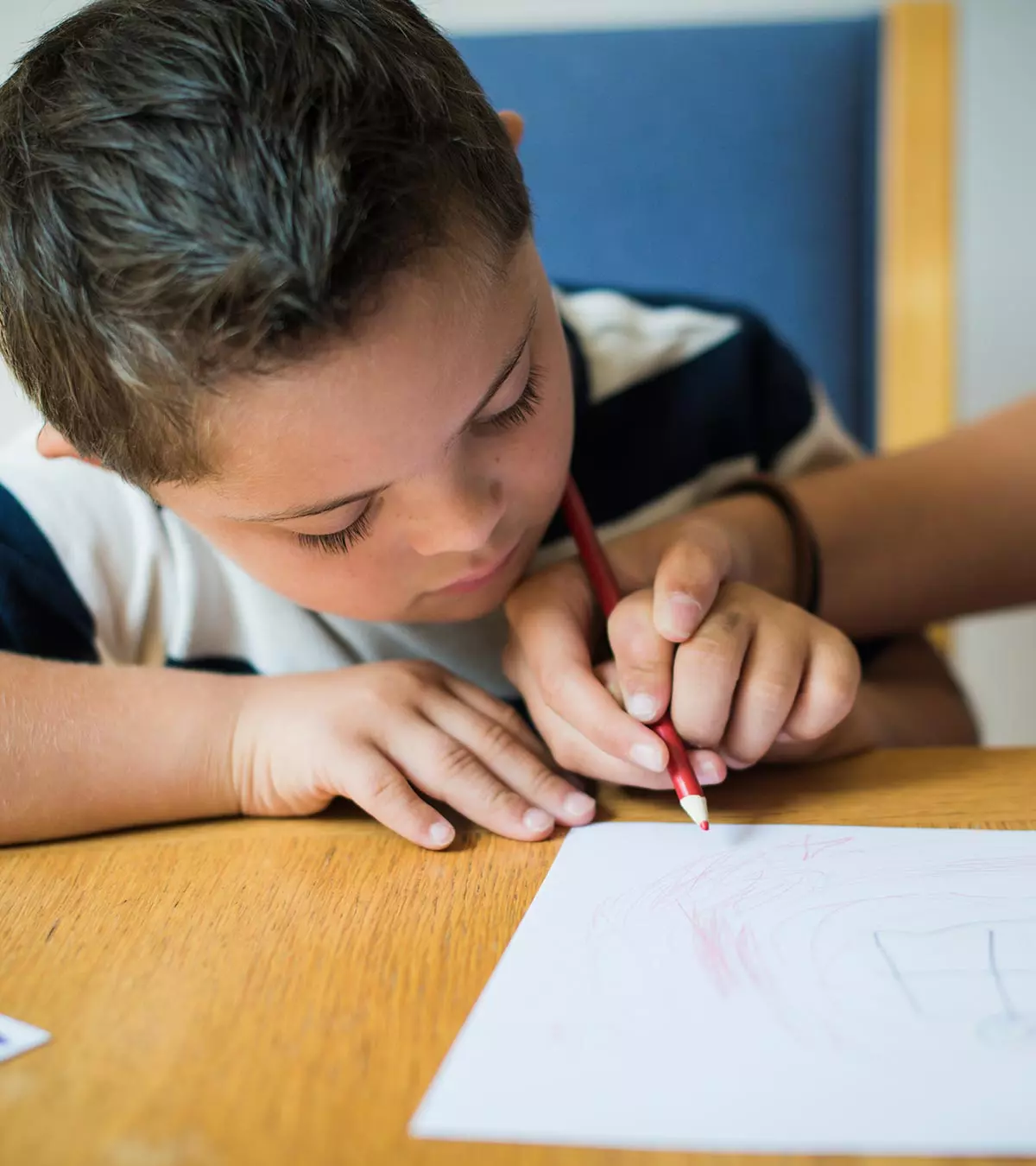
Image: shutterstock
Excessive physical activity or lack of sleep can cause fatigue in children.

However, overly tired kids who do not seem to recover with rest could have underlying health conditions.
Children are naturally energetic and eager to try new things and explore the world. Therefore, if they constantly remain exhausted and dull or lack enthusiasm, it could indicate chronic fatigue syndrome, which affects up to 2 in 1,000 children, as per research.
This post will help you understand the various causes, risks, complications, and treatment options for fatigue in children.
Key Pointers
- Children may sometimes have sleep problems, lethargy, etc., due to excess play or overstimulation.
- However, if they are tired and cannot get out of bed to participate in routine activities, they might have chronic fatigue syndrome.
- Dehydration, nutritional deficiency, infections, and cardiological and neurological disorders are some reasons for children’s fatigue.
- Consult your child’s doctor, who could interpret the cause and help manage this condition.
Symptoms Of Fatigue In Children
It can be challenging to identify symptoms of sudden extreme fatigue in children as most of them may seem subtle before they become intense and may differ from those that usually show up in adults. Here are a few common signs of fatigue in children (1) (2).
- Sluggish or lethargic and an inability to get out of bed and participate in daily activities.
- Sleep issues – The child will either have trouble falling or staying asleep or feel weak even after sleeping.
- Post-exertional malaise (PEM), where the symptoms worsen after minor physical or mental exertion. It usually starts 12 to 48 hours post the activity and might last for days or even weeks (3).
- Dizzy feeling after standing for long hours of sitting in an upright position or feeling snoozy and dozy most of the time.

- Droopy shoulders
- Cognitive difficultiesiDifficulty in memorizing, learning new information, concentrating, and decision making. and memory problems
- Recurrent headaches and sore throat
- Pains in the joints, body, and muscles
- Poor performance in academics and extracurricular activities.
- Emotional symptoms can also indicate fatigue in children. These may include irritability, withdrawal from social interactions, and mood swings.
If you notice any of these symptoms in your child, it is important to know the cause. Although external factors trigger fatigue in most cases, sometimes, it can be due to a medical condition. Either way, it is important to get to the root of the cause. Read the next section to know about some of the possible causes of fatigue in children.
Causes Of Fatigue In Children
Here are some of the possible causes of chronic fatigue in children.
1. Overstimulation
This is the most common reason for fatigue in children. If your child has indulged in excess physical activity, they might appear tired and fatigued for a few days. Sometimes, a stressful and long day spent at school may also cause fatigue in children and make them feel sapped of energy. This is common and may resolve on its own. Fatigue due to overstimulation is often characterized by fuzziness, clumsiness, lethargy, sleepiness, and irritation.
The possibility of over-stimulation from screen time contributing to tiredness in children is worth considering. In 2025, the prevalence of fatigue was higher among 12 to 17-year-olds at 10.9%. Of these adolescents, 12% reported tiredness with over two hours of screen time each day, while 6.5% felt tired with two hours or less.

Percentage of tiredness in children and teens based on their screen time
Source: Percentage of Children and Adolescents Aged 5–17 Years Who Reported Being Tired Most Days or Every Day; Centers for Disease Control and PreventionFatigue due to overstimulation is often characterized by fuzziness, clumsiness, lethargy, sleepiness, and irritation.
2. Dehydration

About 60% of the body is made up of water, and it is one of the important components required for the smooth functioning of the body. Water is also the major constituent of every cell and helps transport oxygen, nutrients, and waste products. Our body loses water when we breathe, sweat, and urinate. When the water level in our body gets depleted, it causes dehydration and the child feels enervated. Chronic dehydration can cause fatigue and dizziness in children.
If your child seems worn out or drained or complains about headaches, tiredness, and light-headedness, it could be due to dehydration (4).
3. Malnutrition
Deficiency in nutrients such as iron, B12, and vitamins may also result in fatigue in children and they may seem listless and weak.
The leading causes of malnutrition are poor diet, drug modalities, infections, etc. Besides fatigue, the other symptoms of malnutrition include weight loss, lethargy, loss of appetite, loss of hair, pale skin, and brittle nails.
It is important to identify the signs early on as malnutrition in children can cause severe consequences in the long-term (5).
4. Sleep disorders
Fatigue in children can also be caused by stress, airway restrictions, and medications. Medical conditions associated with sleep disorders such as juvenile rheumatoid arthritisiPersistent joint pain, swellings, and stiffness in children. , asthma, obstructive sleep apneaiA type of sleeping disorder caused by over-relaxation of muscles in the airway. , insomniaiA sleep disorder that makes it difficult to fall asleep, stay asleep, or get a sound sleep. , restless leg syndromeiA type of medical condition characterized by the irresistible urge to move the legs. , anemia, and insomnia in children can also cause fatigue.
Poor sleep may make them feel sleepy or drowsy during the daytime, increase fatigue, cause absenteeism, and result in poor academic performance. If your child feels constant fatigue, check if it is due to lack of sleep (6).
5. Infectious mononucleosis (IM)
Fatigue is one of the main symptoms of infectious mononucleosis, which is caused by the Epstein-Barr virusiA common type of human herpesvirus that weakens the immune system. (EBV). It belongs to the herpes family and is transmitted through saliva. Mono in kids often raises the risk of developing chronic fatigue syndrome and physical and cognitive problems (7).
6. Congenital heart diseases

Children born with heart issues may exhibit chronic fatigue. One of the rare heart conditions seen in children is pediatric cardiomyopathy, which can lead to a weakened ability of the heart to pump blood, fatigue, heart block, and irregular heartbeats, shortness of breath, chest pain, swelling of legs, and episodes of fainting (8).
7. Depression
Depression in children and adolescents is often overlooked and taken for a typical teenager or child behavior. However, children are susceptible to depression just like adults. They may seem uninterested, indifferent, or apathetic toward others or any activity around them.
If the symptoms are left untreated, they might result in long-term consequences. Some common signs of depression include loss of interest, extreme fatigue, social withdrawal, concentration difficulties, loss of appetite, and sleep disorders (9).
 Quick fact
Quick fact8. Narcolepsy
It is an uncommon, chronic neurological disorder in children that affects their brain’s functioning to regulate sleep and wakefulness. The condition makes children too sleepy during the day, causes an inability to stay awake, and even causes sudden sleep attacks at any time of the day or activity. Although children as young as four to five years old exhibit the symptoms, it is usually a misdiagnosed or underdiagnosed condition in children and only diagnosed in adolescence or later in life.
These children get really tired frequently, especially during inactive times, like reading or sitting. Although preschoolers with this condition can take two to three hours of long afternoon naps, they become tired again within one to two hours. So, if your child looks forgetful, extremely tired, and takes long naps throughout the day, even after five or six years of age, consult a healthcare provider (10).
Risks And Complications Of Fatigue In Children
Children with symptoms of allergies, malnutrition, or underlying medical issues are at a higher risk of developing fatigue.
Fatigue causes not just physical problems but also mental and behavioral problems in children. The following are some of the complications of fatigue.
- Decline in working memory
- Impaired judgment
- Increased susceptibility to infections
- Slower growth
- Deficiency in cognitive and problem-solving skills
Diagnosis Of Fatigue In Children
The doctor might do a physical examination to determine nutrition deficiency or anemia in children. They may also ask you questions about your child’s medical history, medications taken, and allergies. If needed, blood and urine tests might be prescribed.
 Things to know
Things to knowTreatment For Fatigue In Children
Fatigue in children can be treated once the underlying cause is addressed. Here are some common treatment options for fatigue in children.
- If your child has had excess physical activity during the day, encourage them to take adequate rest for a couple of days.

- If the school projects are making them tired, give them time during the weekends to do things they enjoy.
- The World Health Organization (WHO) recommends these water intake levels for children (11).
| Age | Gender | Water requirement/day |
|---|---|---|
| 4–8 years | Boys and girls | 1.7L |
| 9–13 years | Boys | 2.4L |
| Girls | 2.1L | |
| 14–18 years | Boys | 3.3L |
| Girls | 2.3L |
Make sure your child stays hydrated throughout the day. Keep track of their water consumption and remind them to have water. You may also give them fruit juices to keep them hydrated. Increase the quantity on days when your child takes part in sports or strenuous activities.
- If your child is diagnosed with anemia or malnutrition, make sure you include fresh fruits, vegetables, healthy fats, and proteins in their diet. Take your doctor’s help to understand your child’s nutritional requirements and design a diet plan that is apt for their age.
- Establish a sleeping routine to overcome sleep disorders in children. Make sure your child does not use gadgets at least two hours before bedtime, and ensure they have their meals two hours before bedtime. You may also instruct them to take a bath before going to bed. All these activities would help them relax and sleep better.

- If your child suffers from any infections, follow your doctor’s advice. You may also make them take adequate rest, eat a healthy diet, and drink plenty of fluids.
- Make sure your child spends some time under the sun playing or engaging in some physical activity as this would help their bodies to absorb vitamin D.
- Mindfulness activities like meditation and deep breathing can assist children in handling stress and increasing their energy. Adding these practices to daily routine can encourage relaxation, lower stress, and enhance overall health.
- In the case of chronic conditions, your doctor may prescribe physiotherapy, which might help lessen fatigue.
 Point to consider
Point to considerFrequently Asked Questions
1. Which illnesses cause extreme fatigue?
Fatigue in children could be due to several reasons. Some common reasons are chronic fatigue syndrome, deficiencies, heart or lung issues, eating disorders, hormonal imbalances, or emotional stress. Chronic health conditions such as cancer, multiple sclerosisiA type of disorder in which the immune system attacks the central nervous system. , and autoimmune diseasesiConditions in which the body’s immune system mistakes healthy cells as foreign and attacks them. may also cause extreme fatigue (12).
2. Are hyperactive kids tired?
Hyperactivity or ADHDiA neurodevelopmental disorder in children affecting their ability to pay attention, control impulses, and making them hyperactive. could cause tiredness in children. A study by the National Library of Medicine on 147 children diagnosed with ADHD-1 concluded that 14% of children obtained less sleep while 31% had delayed onset of sleep. However, more studies are needed to determine if hyperactivity causes extreme fatigue in children (12).
3. Are there any long-term effects of fatigue in children?
Fatigue in children often does not have any long term effects and is very treatable. When you notice that your child is tired more than usual, contact a medical health practitioner immediately as it is the fastest way to diagnose any underlying health issues and treat them.
4. What role does nutrition play in child fatigue?
Nutrition plays a key role in maintaining a child’s energy levels. A well-balanced diet full of essential vitamins and minerals is important to help prevent fatigue. Parents should ensure their children are getting enough nutrients by keeping an eye on their daily food intake (5).
Tired kids may be unable to get out of bed and do regular activities. Sleep issues, malnutrition, overstimulation, depression, heart diseases, and certain infections can cause fatigue or tiredness in children. They may experience physical and emotional signs and symptoms based on the underlying cause. A detailed physical examination, blood tests, and imaging tests help diagnose the causes. The treatment may vary depending on the cause, including psychotherapies, medications, supplements, or surgery. Timely treatment could prevent complications and improve quality of life.
Infographic: Effective Ways To Deal With Fatigue In Children
Children may frequently feel tired due to their active lifestyles, academic demands, and changing bodies. However, managing tiredness in children is important for their overall health and development. Check out the infographic below for some simple and practical suggestions to manage tiredness or fatigue in children.
Some thing wrong with infographic shortcode. please verify shortcode syntaxIllustration: Signs Of A Tired (Fatigued) Kid Causes & Treatment
_kid_causes__treatment_illustration.jpg.webp)
Image: Stable Diffusion/MomJunction Design Team
References
1. Symptoms of Myalgic Encephalomyelitis/Chronic Fatigue Syndrome; Centers for Disease Control and Prevention (2025).
2. Leonard A. Jason, Kristen Barker, and Abigail Brown; Pediatric Myalgic Encephalomyelitis/Chronic Fatigue Syndrome; HHS Author Manuscripts (2012).
3. Strategies to Prevent Worsening of Symptoms; Centers for Disease Control and Prevention (2025).
4. David Benton; Dehydration Influences Mood and Cognition: A Plausible Hypothesis?; Nutrients (2011).
5. Alamgir Khan et al.; Causes, sign, and symptoms of malnutrition among the children; Journal of Nutrition and Human Health (2017).
6. Amy S. Lewandowski et al.; Sleep Problems in Children and Adolescents with Common Medical Conditions; HHS Author Manuscripts (2011).
7. Leonard A. Jason et al.; Predictors of post-infectious chronic fatigue syndrome in adolescents; Health Psychology and Behavioral Medicine (2014).
8. Pediatric Cardiomyopathy; National Organization for Rare Diseases
9. Childhood Depression; Anxiety & Depression Association of America
10. Narcolepsy in Children; Cleveland Clinic
11. Nutrients in Drinking Water; World Health Organization
12. Fatigue; Cleveland Clinic.
13. Stephen B. Becker et al.; Sleep Habits in Children with Attention-Deficit/Hyperactivity Disorder Predominantly Inattentive Type and Associations with Comorbid Psychopathology Symptoms; National Library of Medicine
14. A tired child? What you should know; Harvard Medical School
Community Experiences
Join the conversation and become a part of our nurturing community! Share your stories, experiences, and insights to connect with fellow parents.
Read full bio of Dr. Richa A Kaushal
Read full bio of Dr Bisny T. Joseph
Read full bio of Dr. Ritika Shah
Read full bio of Vidya Tadapatri





